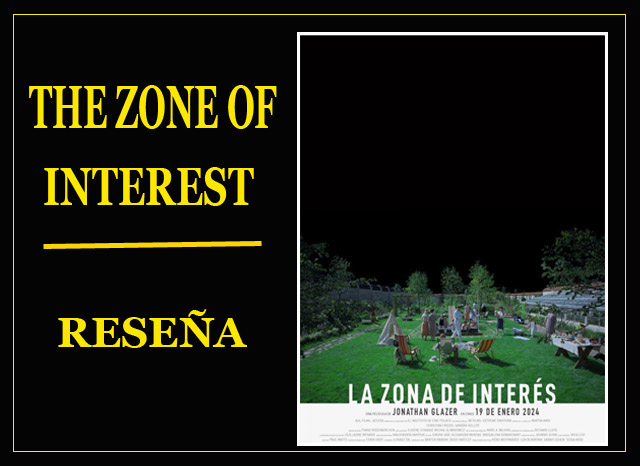
Hay películas que a primera vista pueden resultar cripticas, abstractas, con un mensaje difícil de descifrar…
Puede ser el caso de The Zone of Interest (2023) la aclamada película del director y guionista británico Jonathan Glazer, premio del jurado en Cannes y ganadora al Oscar como mejor película extranjera.
La historia está ambientada durante la segunda guerra mundial y nos cuenta la vida cotidiana de la familia Höss.
Rudolf Höss, y su esposa Hedwig, han levantado una moderna casa para criar a sus cinco hijos, en medio del tétrico campo de concentración de Auschwitz, sitio donde diariamente son asesinados miles de judíos y que ha sido bautizado por la oficialidad nazi como “La Zona de interés”, un eufemismo creado para referirse al sitio donde ocurren todas las atrocidades que la mente humana pueda concebir.
La película es sencilla y a más de uno le puede resultar aburrida. En verdad que uno mira y mira y pareciera que no ocurriera nada, aquí no hay grandes momentos de tensión que centren la atención del espectador. No se cuenta la historia al modo tradicional donde podamos apreciar el clásico esquema de introducción, nudo y desenlace.
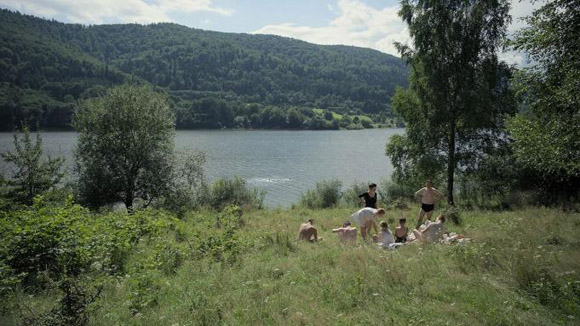
Durante casi todo el metraje lo que vemos es a una familia “normal” haciendo su vida, con los pequeños dramas cotidianos que vive cualquier familia: el hermano mayor que busca someter al menor, la organización del funcionamiento de la casa, la preparación de los niños para ir a la escuela, la esmerada esposa cuidando afanosamente el huerto, el padre amoroso paseando con sus hijos. En fin… Lo más normal que podamos imaginar.
Ni siquiera Rudolf Höss (Christian Friedel ) en su condición de comandante de este campo de exterminio se muestra como alguien atípico, no se ve gritando a su esposa, no les pega a sus hijos. A lo sumo se aprovecha de tener encuentros sexuales con mujeres que no se sabe si son reclusas o campesinas de las zonas vecinas.
Y es precisamente en este no pasar nada, en esta aparente normalidad, donde la película nos puede resultar perturbadora.
Mientras veía la película, sentado frente al televisor, no podía dejar de preguntarme cómo podían vivir allí tan tranquilos. Porque es mentira que no pasa nada. Los Höss han creado una isla en medio del horror. Las señales de lo que pasa a su alrededor son inocultables, les invaden los sentidos. A sus oídos llegan los ecos de los disparos, de los gritos de desesperación y dolor de los prisioneros. Ante sus ojos se levantan las paredes del campo de concentración y ven las chimeneas emanando el espeso humo durante las veinticuatro horas del día… A sus narices llega la hedentina que produce la carne humana cuando es incinerada…
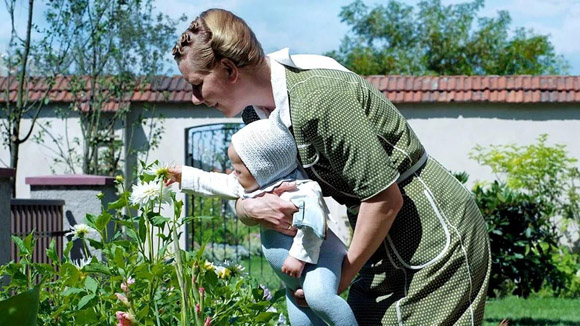
Pero nada de eso conmueve, nada de eso incomoda… Hedwig Höss (Sandra Hüller) la esposa, se sabe una mujer privilegiada, está consciente que vive en una situación envidiable, lejos de las calamidades de los que están en el frente de guerra, rodeada de lujos y sirvientes. Eso es más que suficiente para ella. Lo demás, lo que está fuera de la cerca de su casa no importa para nada. Su insensibilidad es total…
En algún lado leí que los humanos podemos adaptarnos a cualquier cosa, que somos capaces de tolerar hasta lo más abominable. Y de eso trata la película, nos pone ante una situación límite. ¿Cómo podemos seguir viviendo como si nada mientras se cae el mundo a nuestro alrededor…? ¿Cómo podemos ser tan insensibles ante el sufrimiento de los demás…?
De vez en cuando es importante que los cineastas nos confronten con temas como este. La insensibilidad, la falta de empatía, es una de las razones por las que muchos de nuestros problemas como civilización se agravan.
Al desentendernos de lo que pasa a nuestro alrededor y encerrarnos en nuestras islas, como hace la señora Hedwig Höss, estamos renunciando a nuestra capacidad de encontrar soluciones. La complejidad del mundo de hoy exige una gran participación de todos para resolver los asuntos que nos aquejan, y para ello hay que superar la insensibilidad…
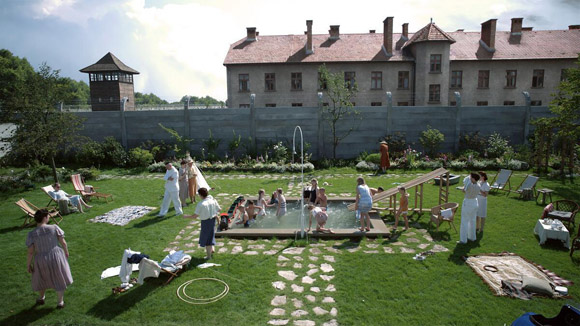
Entre los aciertos de esta film está su originalidad. La gran mayoría de las películas que tratan sobre este momento oscuro de la historia de la humanidad nos han mostrado el tema de las víctimas, su sufrimiento y el drama que vivieron. Pocas veces hemos visto la otra parte, la de los victimarios, personas que en si mismas no son monstruosas, ni diferentes a ninguno de nosotros. Son humanos comunes y corrientes que han llegado a cometer actos atroces confiando en lo que dicen sus creencias, sus ideologías... Aquí Jonathan Glazer nos deja esta otra visión, cuidando que el horror no se manifieste explícitamente, sino que se intuya a partir de su contraparte, la normalidad…
Pueda ser que para los más jóvenes, sobre todo si no son europeos, la película les resulte un poco incomprensible por falta de contexto. No todos conocen lo suficiente sobre ese tiempo del holocausto. En ese sentido me parece que la película peca de omisión, da por descontado que todos tienen las referencias para entender las claves de lo que se está presentado. Y aunque es verdad que en muchas ocasiones se presentan conversaciones entre los militares nazis planificando sus sistemas de exterminio, pienso que faltó más información sobre el momento histórico. Quizá `por eso algunos opinan que la película es confusa.
Esta película no está pensada para el gran público, pero sin duda que puede dar mucho material para estimular la reflexión. Su originalidad y los temas tratados pueden ser suficientes motivos como para darle un visionado. Si tienen la oportunidad denle un chance…
Gracias por tu tiempo.
Fuente de imágenes. I II III IV


There are films that at first glance may seem cryptic, abstract, with a message that is difficult to decipher.
This may be the case of The Zone of Interest (2023), the acclaimed film by British director and screenwriter Jonathan Glazer, winner of the Jury Prize at Cannes and Oscar for Best Foreign Film.
The story is set during World War II and tells the story of the daily life of the Höss family.
Rudolf Höss and his wife Hedwig have built a modern house to raise their five children, in the middle of the dark concentration camp of Auschwitz, a place where thousands of Jews are murdered daily and which has been baptized by the Nazi officialdom as "The Zone of Interest", a euphemism created to refer to the place where all the atrocities that the human mind can conceive of occur.

The film is simple and more than one may find it boring. In truth, one watches and watches and it seems that nothing happens, there are no great moments of tension to focus the viewer's attention. The story is not told in the traditional way where we can appreciate the classic scheme of introduction, plot and denouement.
During most of the film what we see is a "normal" family going about its life, with the small daily dramas that any family lives: the older brother who seeks to subdue the younger, the organization of the running of the house, the preparation of the children to go to school, the caring wife busily tending the garden, the loving father walking with his children... In short, the most normal. In short... The most normal thing we can imagine.
Even Rudolf Höss (Christian Friedel), as commandant of this extermination camp, is not atypical, he does not yell at his wife, he does not beat his children. At most, he takes advantage of having sexual encounters with women, who we do not know whether they are inmates or peasant women from the neighboring areas.
And it is precisely in this not happening, in this apparent normality, that the film can be disturbing.
As I watched the film, sitting in front of the television, I could not help but wonder how they could live there so quietly. Because it is a lie that nothing is happening. The Höss have created an island in the midst of horror. The signs of what is going on around them are unmistakable, invading their senses. To their ears come the echoes of gunshots, of the cries of despair and pain of the prisoners. Before their eyes rise the walls of the concentration camp and they see the chimneys emanating thick smoke twenty-four hours a day... To their nostrils comes the stench produced by the human flesh when it is incinerated...

But none of it is moving, none of it is uncomfortable.... Hedwig Höss (Sandra Hüller), the wife, knows she is a privileged woman, aware that she lives in an enviable situation, far from the calamities of those on the war front, surrounded by luxuries and servants. That is more than enough for her. The rest, what is outside the fence of her house does not matter at all. Her insensitivity is total...
Somewhere I read that humans can adapt to anything, that we are able to tolerate even the most abominable. And that's what the film is about, it puts us in a limit situation, how can we go on living as if nothing is happening while the world is falling down around us... How can we be so insensitive to the suffering of others...?
From time to time it is important for filmmakers to confront us with themes like this. Insensitivity, lack of empathy, is one of the reasons why many of our problems as a civilization are compounded.
By disengaging from what is going on around us and shutting ourselves away in our islands, as Mrs. Hedwig Höss does, we are giving up our ability to find solutions. The complexity of today's world demands a great participation of everyone to solve the issues that afflict us, and for this we must overcome insensitivity...

Among the successes of this film is its originality. The vast majority of films dealing with this dark moment in the history of mankind have shown us the victims, their suffering and the drama they lived through. Rarely have we seen the other side, that of the victimizers, people who in themselves are not monstrous, nor different from any of us. They are ordinary humans who have come to commit atrocious acts trusting in what their beliefs and ideologies say.... Here Jonathan Glazer leaves us this other vision, taking care that the horror is not explicitly manifested, but that it is intuited from its counterpart, normality...
It may be that for younger people, especially if they are not European, the film may be a little incomprehensible due to lack of context. Not everyone knows enough about that time of the Holocaust. In that sense, it seems to me that the film is guilty of omission, it takes for granted that everyone has the references to understand the keys to what is being presented. And although it is true that on many occasions there are conversations between the Nazi military planning their extermination systems, I think that more information about the historical moment was missing. Perhaps that is why some people find the film confusing.
This film is not intended for the general public, but it can certainly provide a lot of food for thought. Its originality and the themes it deals with may be enough reasons to give it a viewing. If you have the opportunity, give it a chance...
Thanks for your time.
Translated with DeepL.com (free version)

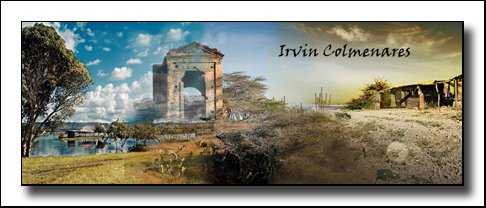




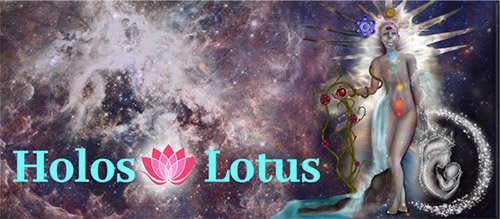

Comunidad Be Entrepreneur

I plan to see this film, when I read its plot when it was nominated for the Oscars it immediately caught my attention, to see that other side of the story, to see the holocaust from the side of the "bad guys", how they lived and what they did, it's an unknown that I found interesting, I'll see what it's like.
There you will see that other side. I hope you get a chance to see the film. Thanks for stopping by and for the support dear @syberia . A big hug from Maracay.
Excelente reseña @irvinc
A mí me gustó mucho esta película; la manera de usar un relato de un dilema familiar que ha encontrado estabilidad en un hogar lleno de privilegios, pero que es amenazada porque al jefe de familia se le cambiará de puesto, de esa manera se puede explorar esta historia como un drama familiar en dónde justamente, una familia muestra su imperfección al lidiar con un gran problema; ahora lo que hace más impactante es la ideología de la familia y el lugar donde está situada el hogar; cuando vi eso, pense en la excelente narrativa, es una historia que así como usted dice, no pasa nada, pero al ser basada en hechos reales, es eso lo que da mucha importancia.
Cuando veía la película pensaba en nosotros, acá en el país, hay tanta gente que sigue su vida sin interesarle lo que pasa...¿Te imaginas viviendo en medio de un campo de concentración...? Es impresionante como plantean el tema. Gracias por pasar y por el apoyo estimado @nameless16. Un fuerte abrazo desde Maracay.
The people in this movie are cruel, they have so much money that they don't pay much attention to what surrounds them, they have a perfect life because they are located far from society and they don't deal much with people unless they are from his same class.
This movie catches my attention for that part, seeing that they have so much chaos around them and that they always learn not to pay attention to them, the plot looks too good, I will put it on my list.
La película es interesante porque nos muestra esa parte de la insensibilidad humana. Puede ser un poco lenta, sin embargo, creo que merece ser vista. Gracias por pasar y comentar estimado @lionsaturbix. Un fuerte abrazo desde Maracay.